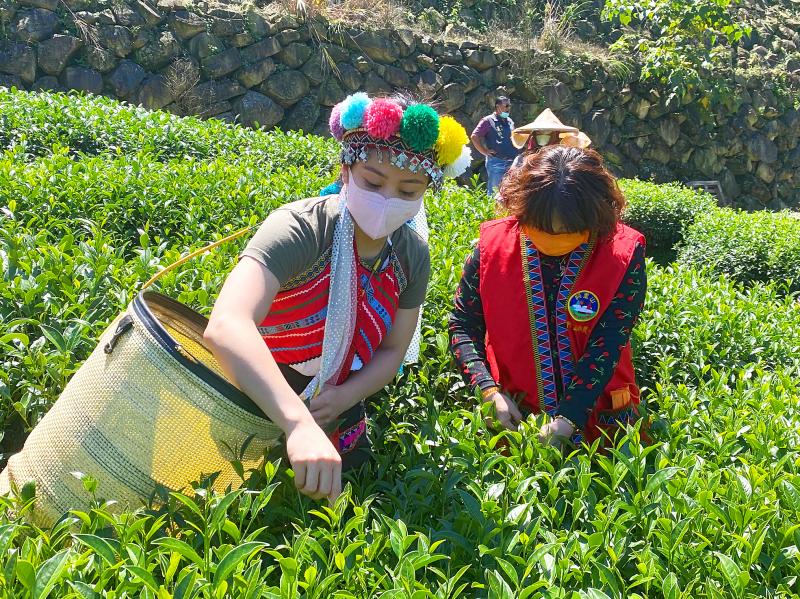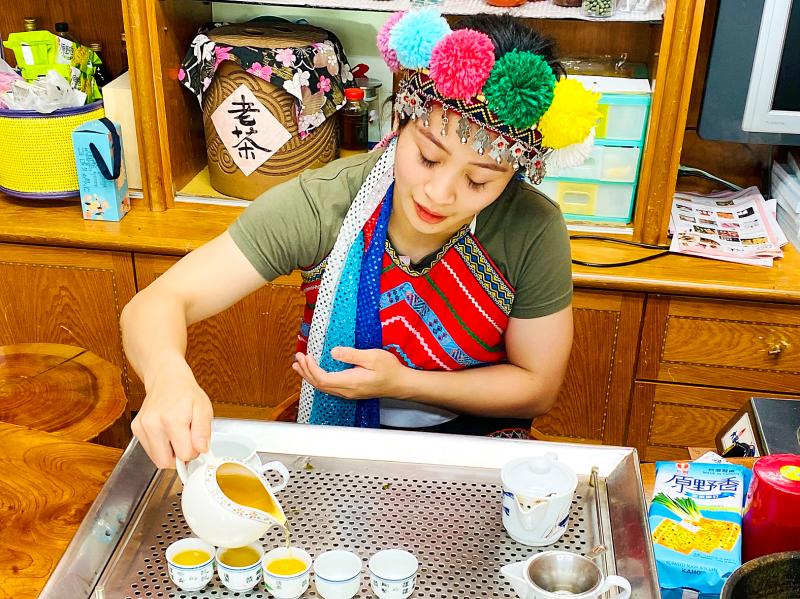Tsou Aborigine Fang Wan-ling, who represented Taiwan at the 2020 Tokyo Olympics and attained fourth place in the women’s 49kg weightlifting event, last week returned to her home village in Chiayi County to act as spokesperson for Alishan high mountain tea.
Although Fang’s family moved from Chiayi County to Tainan many years ago, after becoming an overnight sensation during the Olympics, she decided to return to her roots in Chiayi and use her celebrity stardust to promote her home region. Fang traveled deep into the Alishan mountain range to pick tea leaves at an alpine tea plantation. Although it was strenuous work, Fang had no complaints and wore her usual smile, beaming from ear to ear throughout.
Fang’s maternal uncle Wu Ching-shan, who is a Chiayi County councilor, says Fang moved to Tainan when she was a second-year student at Lalayua Elementary School because of her mother’s work. However, Fang keeps up ties with her home village, to which she has returned twice since the Olympics. During this trip, Fang was able to stay for a relatively long time and elected to pick tea at a high-altitude tea garden in the Tfuya area of Tapangu Village, after which she traveled to the New Fuyuan tea processing factory to learn about sun-withering and other aspects of tea production.

Photo: Tsai Tsung-hsun, Liberty Times 照片:自由時報蔡宗勳
Fang says she often helped her grandmother pick tea as a kindergarten student and, as a little child, she would often play hide-and-seek among the tea bushes. Fang adds that these childhood memories are still fresh in her mind and her experience of picking tea as an adult, bending over the tea bushes and dripping in sweat, felt somewhat different from before. Having appreciated how much labor goes into tea production, Fang hopes she can do her bit to help market her home village’s aromatic high mountain tea.
(Liberty Times, translated by Edward Jones)
東京奧運舉重比賽拿下女子四十九公斤級第四名、嘉義縣鄒族方莞靈,上週返鄉代言大阿里山高山茶。

Photo: Tsai Tsung-hsun, Liberty Times 照片:自由時報蔡宗勳
即使方莞靈已經舉家搬至台南市居住,因奧運瞬間成名後,她並不忘本,奧運結束後返嘉參加活動,並深入偏遠的高山茶園實地採茶,過程相當辛苦,但她不喊累,依舊笑容可掬。
方莞靈的舅舅、嘉義縣議員武清山指出,方莞靈讀到樂野國小二年級時,因媽媽工作的關係搬到台南市居住,但跟家鄉仍互動熱絡,這次回故鄉是奧運比賽返國後第二次,因時間比較充裕,安排到達邦村特富野的高海拔茶園體驗採茶,並到新福源製茶廠了解日光萎凋等過程。
方莞靈說,讀幼兒園的時候常跟著奶奶去茶園採茶,那時候因個子小,經常躲在茶叢中玩樂,這個童年記憶仍歷歷在目,這次彎著腰採茶又是不一樣的體驗,沒一會兒就汗如雨下,真的很辛苦,覺得甘甜的故鄉茶來之不易,有機會就會大力幫忙行銷。
(自由時報蔡宗勳)

詞法—不定詞的誤用 1. 我得記住星期五要把報告寫好。 ˇ I must remember to finish my report by Friday. χ I must remember finishing my report by Friday. 註︰remember 後面跟動名詞或不定詞表示兩種不同的概念,與 forget 相類似。 試比較下列句子: I remember meeting him somewhere.(我記得曾經在某處見過他。) I must remember to meet him at the station at six this evening. (我必須記住今晚六點得去車站接他。) He remembered turning off the light when he left the room. (他記得離開房間時曾先把燈熄了。) Remember to turn off the light when you leave the room. (記住離開房間時要把燈關了。) 2. 他提醒她做好她份內的事。 ˇ He reminded her to do her job. χ He reminded her of doing her job. 註︰remind ... of ... 後面跟動名詞,表示「使人想起做過某事」。若是「提醒某人應做某事」,應用 remind ... to do ...。試比較下列句子: He reminded me of my attending the lecture last Friday. (他讓我想起我上星期五去聽過那次演講。) He

A: Happy New Year! I can’t believe it’s 2026 already. Where did you count down? B: I went to pop singer A-mei’s Taitung concert yesterday for the New Year’s countdown. How about you? A: I went to rock band Mayday’s Taichung concert yesterday. Going to their New Year’s shows has become a holiday tradition for me. B: Don’t forget, we’re also going to Jolin Tsai’s show tonight. It’s her first perfomance at the Taipei Dome. A: Yeah, that’s right. It’s great to start the year with good friends and good music. A: 新年快樂!我真不敢相信都已經2026年了。你昨天去哪跨年啦? B: 我昨天去了流行天后張惠妹的台東演唱會,還和她一起跨年倒數。那你呢? A:

A: Apart from Taiwan’s A-mei, Mayday and Jolin Tsai, there are many foreign singers coming to Taiwan early this year. B: The South Korean girl group Babymonster are playing two shows at Taipei Arena starting from tonight. Who else is coming to Taiwan? A: Other artists include Australian band Air Supply, K-pop superstar Rain, boy group Super Junior, TXT, US singers Giveon and Josh Groban, and Irish boy group Westlife. B: Air Supply was the first foreign band to come to Taiwan in 1983, and they’re probably the most frequently visiting group too. A: As the year is beginning

Kendrick Lamar is a world-renowned rapper with numerous accolades to his name. He has won 22 Grammy Awards and __1__ music charts in countries all around the globe. One unexpected accomplishment he can add to the list is being a lifesaver, thanks to his 2024 hit “Not Like Us.” According to the American Heart Association (AHA), this song has the perfect tempo for performing Hands-Only CPR. Cardiopulmonary Resuscitation (CPR) is a critical lifesaving __2__ used when someone suffers cardiac arrest and their heart stops beating. It aims to maintain blood flow to vital organs until __3__ help arrives. There